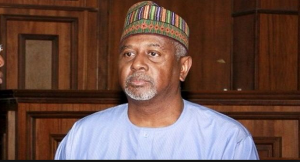Dasuki’s Secret Trial In Whose Interest
Francis Abayomi
The decision to put Colonel Sabo Dasuki, the former National Security Adviser (NSA) on secret trial apparently with the view to shield the public from identities of witnesses and possibly; the scope of their revelations couldn’t be an exact and accurate position after all. To adopt this position at this point of a trial that is admittedly not absolutely legal but essentially a politically dependent issue should raise serious concern. The high level public engagement already elicited by the gravity of the allegations that are now in public domain as well as the controversies that have attended Dasuki’s detention so far seem to have made the insistence by the government on secret trial unpersuasive.
It doesn’t sound exactly factual that Dasuki’s crimes are difficult to handle without the possible security throwback? Two solid years appears more than enough to dismantle whatever landmines Dasuki perhaps could have plotted against this government to have warranted prevarications over the public trial of a man who allegedly was the conduit pipe of the much publicised corruption perpetrated by the previous administration. After two years of dillydallying over a trial that should have been treated as matter of public interest, contemplating a military trial, as suggested in some quarters, of man who accepted a public assignment in a democratic dispensation is not only laughable but a huge insult to the collective psyche of genuine democrats in Nigeria and the world at large.
The government and not the accused should take the responsibility for detaining a citizen, regardless of his crime, for close to two years and for flouting orders of the courts for his release. Therefore, if the possibility of secret trial didn’t occur to the government at the time of churning out those allegations against Dasuki, it could not in good conscience be a conceivable idea now. To this extent, a secret trial; conclusive or in perpetuity would only amount to merely deepening the theories of political persecution in spite of the undeniable; sky-scraping tag of corruption which the former NSA would find almost impossible to obliterate even if eventually no conviction is secured against him; in the prevailing will-o’-the-wisp war against corruption.
However, more than the interest of the man at the centre of the trial, the public deserves the benefit of first-hand defence from a former public office holder accused of monumental breaches of the commission of an exalted office. What again would the state possibly be seeking to shield from the public in spite of the mindboggling revelations bordering on corruption and illegal arms possession? If Dasuki acted in manners capable of torpedoing the security of the country while in office as NSA or immediately after the change of guard at the presidency, the public should be availed of the extent of such treasonably acts. No allegation against Dasuki could be perceived as purely exclusive to the government or possibly injurious to the collective interest of the security of the nation after two years of detention and violation of rights to temporary relief as granted by the law court.
While it is conceded that those in the know at the corridors of power should know more than the rest of us when it bothers on security, but there is no assurance that the conclusion of politicians at the helms of affairs is entire borne out of altruism. How are we sure the motive of the authority is in the best interest of the citizens who should know more than what the secret trial of former NSA portends. Perhaps the trial of the former security adviser if public conducted will ultimately be in the best interest of the country. A public trial will have been more like it, if we are really serious about dealing with the evil of corruption and in particular the lawlessness of our elected chief executives who hide under security votes to perpetrate pilfering in the name of providing security.
But beyond the possibility of an exposé rendered no-holds-barred in the event of a public trial, the public deserves to hear what Dasuki has to say concerning the grave allegations against him which are beyond the issues of corruption. However, it shouldn’t be, as some are already suggesting, that the government is not comfortable with the likelihoods of Dasuki spilling the beans with revelations about how much he knew than the rest of us. In a society where credulity, more often than not, dominates popular opinions when it comes to national affairs, the implications of public trial of Dasuki may eventually turns out to be far beyond what the authorities bargain. But in whose interest would controversies arising from a public trail of Dasuki be if it eventually gets that pretty interesting. No doubt, not in the interests of the power elite! The truth remains that the interest of the public is usually a secondary matter when politics takes precedent over the law of the land and strangely in a democracy. The so called trial of Dasuki may not be in the interest of the general public and the ordinary citizens. Maybe precisely why the motive behind insistence on secret trial has become almost non-negotiable!

